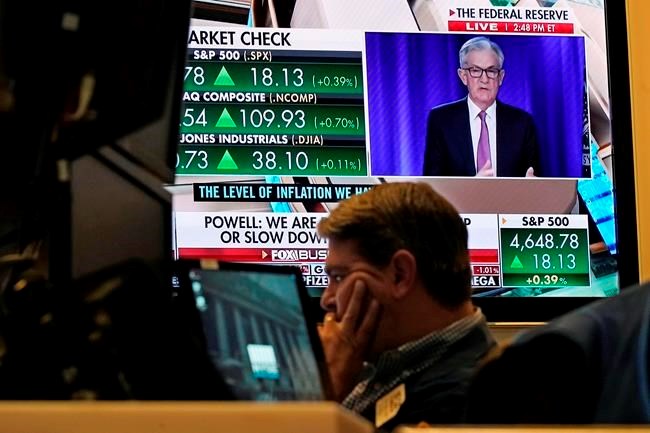TORONTO — North American stock markets rose on optimism fuelled by strong U.S. retail sales numbers that suggest consumers aren't deterred by high inflation.
October sales beat expectations as they rose 1.7 per cent, compared with a 0.8 per cent increase in September.
The increase came even though consumer prices surged 6.2 per cent from a year ago for the highest inflation in more than 30 years.
The positive sentiment was buoyed by strong earnings reports from Walmart and Home Depot, signalling that the upcoming holiday shopping season could be strong despite rising prices.
"I think people will spend a lot of money in the coming month and a half and that'll be great for the markets, great for the economy and I think pretty much if you're an investor today, it's a green light," said Allan Small, senior investment adviser at IA Private Wealth.
"It's a green light for now until we hear that the Fed is considering raising rates and when that will happen."
Small believes markets are in a so-called Goldilocks situation with oil prices hanging around US$80 a barrel, everyone excited about the market and businesses saying things are tough but getting better.
"I just think everyone is looking to the time of year where we're in right now. Seasonally, it's the best time of year for investors and people are excited for money to work," he said in an interview.
The S&P/TSX composite index closed up 34.08 points to 21,717.16 after hitting an intraday record of 21,796.16.
In New York, the Dow Jones industrial average was up 54.77 points at 36,142.22. The S&P 500 index was up 18.10 points at 4,700.90, while the Nasdaq composite was up 120.01 points at 15,973.86.
Technology led the way, gaining 1.3 per cent despite a rise in bond yields. The 10-year Canadian bond climbed to 1.783 per cent, outpacing the U.S. 10-year at 1.644 per cent. Bond yields tend to rise when the economy is strengthening.
Technology stocks typically do worse in higher-rate environments because future profits are less attractive to investors.
But Small said growth from technology is needed to offset higher inflation.
"It's been the best performing sector for years now, and at times it's been actually a good place to be to play defence as well, especially during COVID times," he said.
Industrials, financials and consumer staples were also higher.
Materials was the biggest laggard on the TSX, losing 0.85 per cent as gold prices fell as a result of the movement in bond yields.
The December gold contract was down US$12.50 at US$1,854.10 an ounce and the December copper contract was down 4.9 cents at US$4.35 a pound.
Energy was slightly lower as crude oil prices fell with Cenovus Energy Inc. off one per cent.
The December crude oil contract was down 12 cents at US$80.76 per barrel and the December natural gas contract was up 16 cents at US$5.18 per mmBTU.
After surging this year, crude prices have softened on the prospect of increased supply either from OPEC, other producers or the U.S. opening up its strategic petroleum reserves. High energy prices have contributed to elevated inflation with higher prices at the pumps and extra costs of goods being passed on to consumers.
"The cost of shipping goods is just through the roof. Something has to be done and we gotta get oil prices down," said Small, who forecasts crude will start moving toward US$70.
He said prices are manipulated by a few countries that can "cause people a lot of grief, cause countries a lot of grief."
The Canadian dollar traded for 79.68 cents US compared with 79.89 cents US on Monday.
This report by The Canadian Press was first published Nov. 16, 2021.
Companies in this story: (TSX:CVE, TSX:GSPTSE, TSX:CADUSD=X)
Ross Marowits, The Canadian Press



